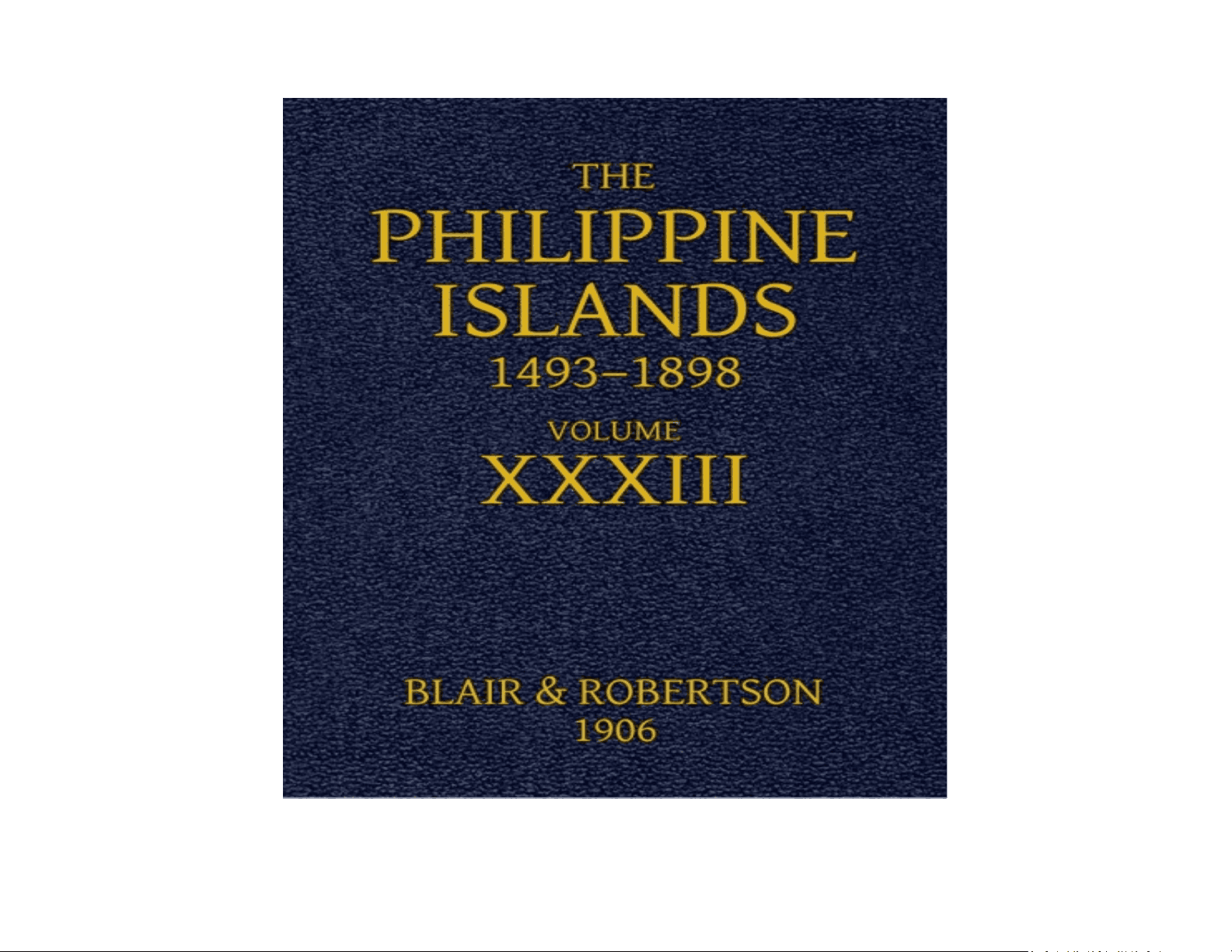
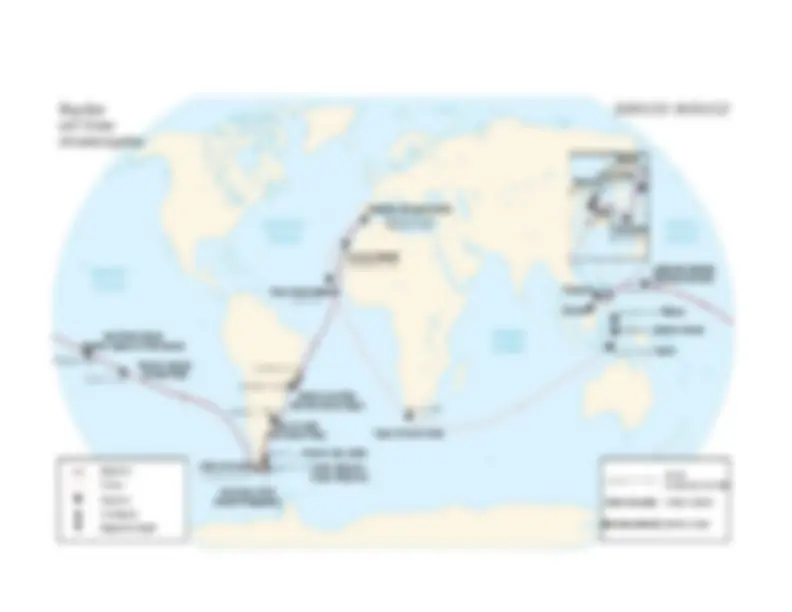
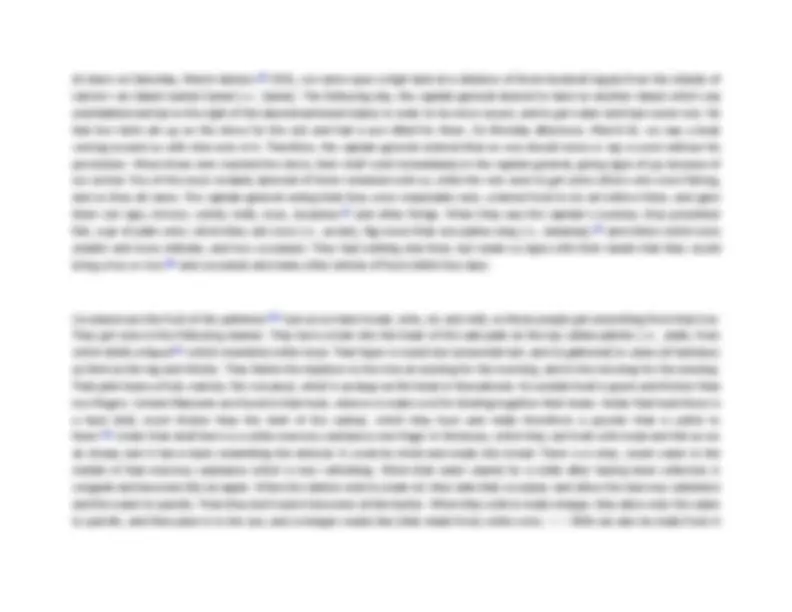
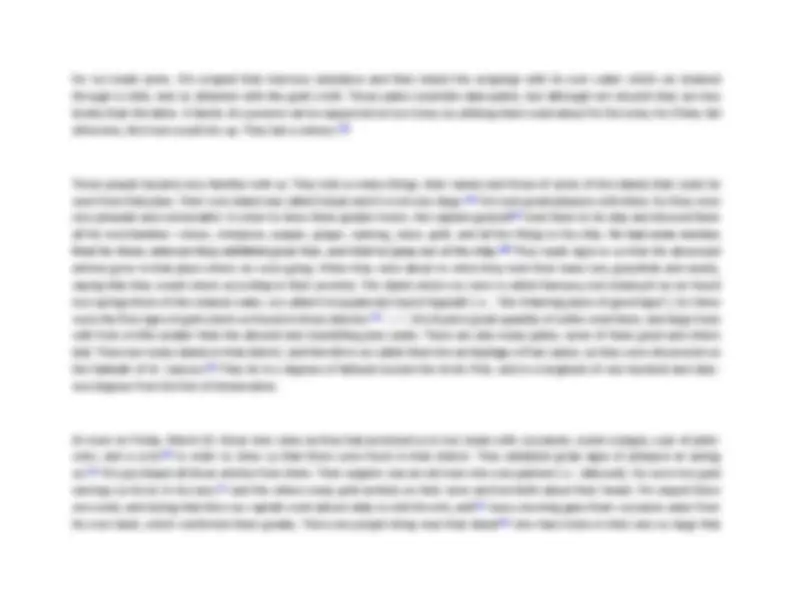
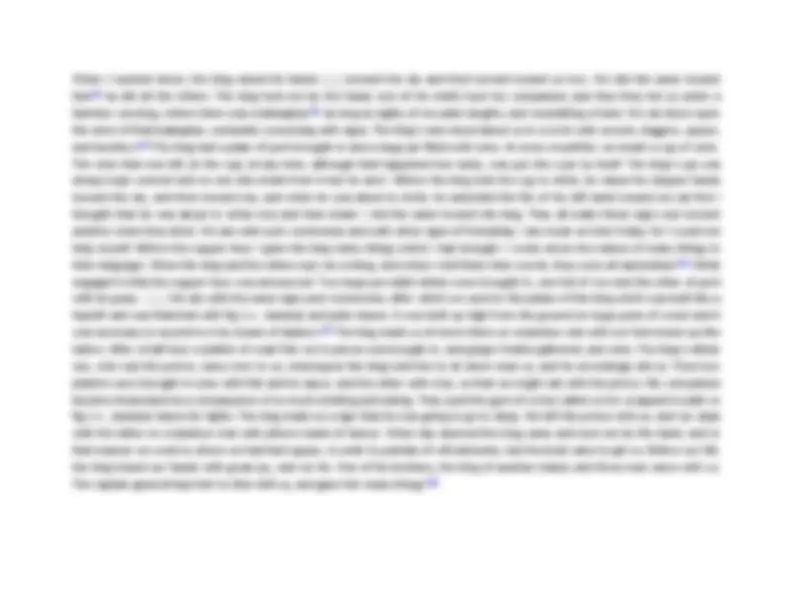
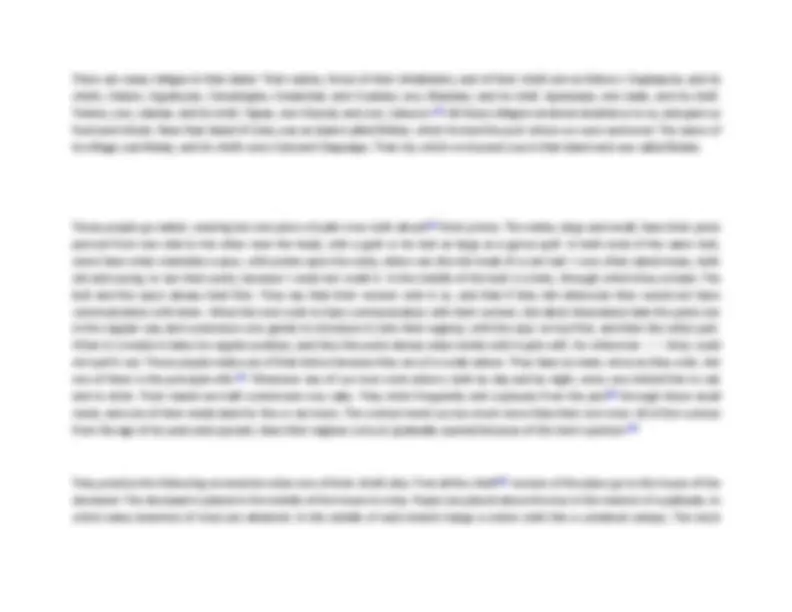
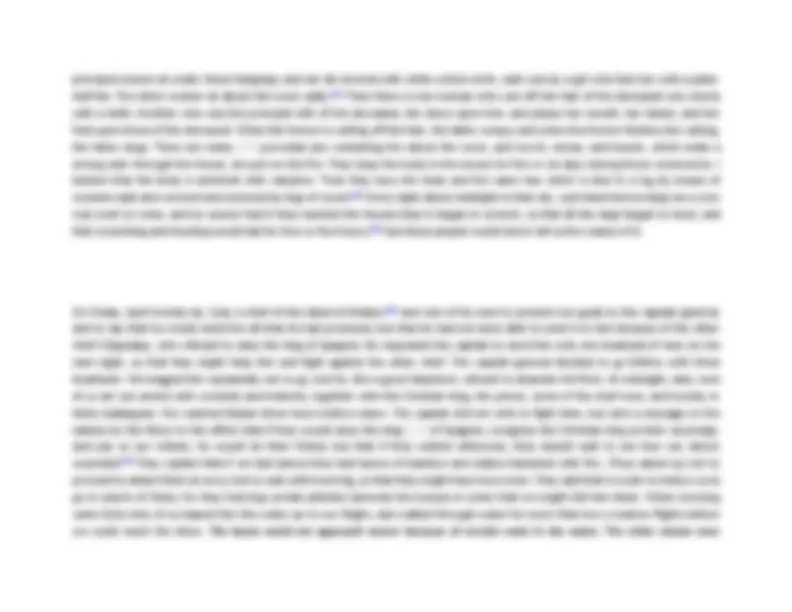


Study with the several resources on Docsity

Earn points by helping other students or get them with a premium plan


Prepare for your exams
Study with the several resources on Docsity

Earn points to download
Earn points by helping other students or get them with a premium plan
Community
Ask the community for help and clear up your study doubts
Discover the best universities in your country according to Docsity users
Free resources
Download our free guides on studying techniques, anxiety management strategies, and thesis advice from Docsity tutors
The First Voyage Around the World
Typology: Papers
1 / 12

This page cannot be seen from the preview
Don't miss anything!







At dawn on Saturday, March sixteen,^196 1521, we came upon a high land at a distance of three hundred leguas from the islands of Latroni—an island named Zamal [ i.e. , Samar]. The following day, the captain-general desired to land on another island which was uninhabited and lay to the right of the abovementioned island, in order to be more secure, and to get water and have some rest. He had two tents set up on the shore for the sick and had a sow killed for them. On Monday afternoon, March 18, we saw a boat coming toward us with nine men in it. Therefore, the captain-general ordered that no one should move or say a word without his permission. When those men reached the shore, their chief went immediately to the captain-general, giving signs of joy because of our arrival. Five of the most ornately adorned of them remained with us, while the rest went to get some others who were fishing, and so they all came. The captain-general seeing that they were reasonable men, ordered food to be set before them, and gave them red caps, mirrors, combs, bells, ivory, bocasine,^197 and other things. When they saw the captain’s courtesy, they presented fish, a jar of palm wine, which they call uraca [ i.e. , arrack], figs more than one palmo long [ i.e. , bananas],^198 and others which were smaller and more delicate, and two cocoanuts. They had nothing else then, but made us signs with their hands that they would bring umay or rice,^199 and cocoanuts and many other articles of food within four days. Cocoanuts are the fruit of the palmtree.^200 Just as we have bread, wine, oil, and milk, so those people get everything from that tree. They get wine in the following manner. They bore a hole into the heart of the said palm at the top called palmito [ i.e. , stalk], from which distils a liquor^201 which resembles white must. That liquor is sweet but somewhat tart, and [is gathered] in canes [of bamboo] as thick as the leg and thicker. They fasten the bamboo to the tree at evening for the morning, and in the morning for the evening. That palm bears a fruit, namely, the cocoanut, which is as large as the head or thereabouts. Its outside husk is green and thicker than two fingers. Certain filaments are found in that husk, whence is made cord for binding together their boats. Under that husk there is a hard shell, much thicker than the shell of the walnut, which they burn and make therefrom a powder that is useful to them.^202 Under that shell there is a white marrowy substance one finger in thickness, which they eat fresh with meat and fish as we do bread; and it has a taste resembling the almond. It could be dried and made into bread. There is a clear, sweet water in the middle of that marrowy substance which is very refreshing. When that water stands for a while after having been collected, it congeals and becomes like an apple. When the natives wish to make oil, they take that cocoanut, and allow the marrowy substance and the water to putrefy. Then they boil it and it becomes oil like butter. When they wish to make vinegar, they allow only the water to putrefy, and then place it in the sun, and a vinegar results like [that made from] white wine. [ 107 ]Milk can also be made from it
for we made some. We scraped that marrowy substance and then mixed the scrapings with its own water which we strained through a cloth, and so obtained milk like goat’s milk. Those palms resemble date-palms, but although not smooth they are less knotty than the latter. A family of x persons can be supported on two trees, by utilizing them week about for the wine; for if they did otherwise, the trees would dry up. They last a century.^203 Those people became very familiar with us. They told us many things, their names and those of some of the islands that could be seen from that place. Their own island was called Zuluan and it is not very large.^204 We took great pleasure with them, for they were very pleasant and conversable. In order to show them greater honor, the captain-general^205 took them to his ship and showed them all his merchandise—cloves, cinnamon, pepper, ginger, nutmeg, mace, gold, and all the things in the ship. He had some mortars fired for them, whereat they exhibited great fear, and tried to jump out of the ship.^206 They made signs to us that the abovesaid articles grew in that place where we were going. When they were about to retire they took their leave very gracefully and neatly, saying that they would return according to their promise. The island where we were is called Humunu; but inasmuch as we found two springs there of the clearest water, we called it Acquada da li buoni Segnialli [ i.e. , “the Watering-place of good Signs”], for there were the first signs of gold which we found in those districts.^207 [ 109 ]We found a great quantity of white coral there, and large trees with fruit a trifle smaller than the almond and resembling pine seeds. There are also many palms, some of them good and others bad. There are many islands in that district, and therefore we called them the archipelago of San Lazaro, as they were discovered on the Sabbath of St. Lazurus.^208 They lie in x degrees of latitude toward the Arctic Pole, and in a longitude of one hundred and sixty- one degrees from the line of demarcation. At noon on Friday, March 22, those men came as they had promised us in two boats with cocoanuts, sweet oranges, a jar of palm- wine, and a cock,^209 in order to show us that there were fowls in that district. They exhibited great signs of pleasure at seeing us.^210 We purchased all those articles from them. Their seignior was an old man who was painted [ i.e. , tattooed]. He wore two gold earrings [ schione ] in his ears,^211 and the others many gold armlets on their arms and kerchiefs about their heads. We stayed there one week, and during that time our captain went ashore daily to visit the sick, and^212 every morning gave them cocoanut water from his own hand, which comforted them greatly. There are people living near that island^213 who have holes in their ears so large that
who entered the ship, and gave them some presents, for which the king wished before his departure to give the captain a large bar^221 of gold and a basketful of ginger. The latter, however, thanked the king heartily but would not accept it. In the afternoon we went in the ships [and anchored] near the dwellings of the king. Next day, holy Friday, the captain-general sent his slave, who acted as our interpreter, ashore in a small boat to ask the king if he had any food to have it carried to the ships;^222 and to say that they would be well satisfied with us, for he [and his men] had come to the island as friends and not as enemies. The king came with six or eight men^223 in the same boat and entered the ship. He embraced the captain-general to whom he gave three porcelain jars covered with leaves and full of raw rice, two very large orade ,^224 and other things. The captain-general gave the king a garment of red and yellow cloth made in the Turkish fashion, and a fine red cap; and to the others (the king’s men), to some knives and to others mirrors. Then the captain-general [ 117 ]had a collation spread for them, and had the king told through the slave that he desired to be casi casi^225 with him, that is to say, brother. The king replied that he also wished to enter the same relations with the captain-general. Then the captain showed him cloth of various colors, linen, coral [ornaments], and many other articles of merchandise, and all the artillery, some of which he had discharged for him, whereat the natives were greatly frightened. Then the captain-general had a man armed as a soldier,^226 and placed him in the midst of three men armed with swords and daggers, who struck him on all parts of the body. Thereby was the king rendered almost speechless. The captain-general told him through the slave that one of those armed men was worth one hundred of his own men. The king answered that that was a fact. The captain-general said that he had two hundred men in each ship who were armed in that manner.^227 He showed the king cuirasses, swords, and bucklers, and had a review made for him.^228 Then he led the king to the deck of the ship, that is located above at the stern; and had his sea-chart and compass brought.^229 He told the king through the interpreter how he had found the strait in order to voyage thither, and how many moons he had been without seeing land, whereat the king was astonished. Lastly, he told the king that he would like, if it were pleasing to him, to send two of his men with him so that he might show them some of his things. The king replied that he was agreeable, and I went in company with one of the other men.^230
When I reached shore, the king raised his hands [ 119 ]toward the sky and then turned toward us two. We did the same toward him^231 as did all the others. The king took me by the hand; one of his chiefs took my companion; and thus they led us under a bamboo covering, where there was a balanghai,^232 as long as eighty of my palm lengths, and resembling a fusta. We sat down upon the stern of that balanghai, constantly conversing with signs. The king’s men stood about us in a circle with swords, daggers, spears, and bucklers.^233 The king had a plate of pork brought in and a large jar filled with wine. At every mouthful, we drank a cup of wine. The wine that was left [in the cup] at any time, although that happened but rarely, was put into a jar by itself. The king’s cup was always kept covered and no one else drank from it but he and I. Before the king took the cup to drink, he raised his clasped hands toward the sky, and then toward me; and when he was about to drink, he extended the fist of his left hand toward me (at first I thought that he was about to strike me) and then drank. I did the same toward the king. They all make those signs one toward another when they drink. We ate with such ceremonies and with other signs of friendship. I ate meat on holy Friday, for I could not help myself. Before the supper hour I gave the king many things which I had brought. I wrote down the names of many things in their language. When the king and the others saw me writing, and when I told them their words, they were all astonished.^234 While engaged in that the supper hour was announced. Two large porcelain dishes were brought in, one full of rice and the other of pork with its gravy. [ 121 ]We ate with the same signs and ceremonies, after which we went to the palace of the king which was built like a hayloft and was thatched with fig [ i.e. , banana] and palm leaves. It was built up high from the ground on huge posts of wood and it was necessary to ascend to it by means of ladders.^235 The king made us sit down there on a bamboo mat with our feet drawn up like tailors. After a half-hour a platter of roast fish cut in pieces was brought in, and ginger freshly gathered, and wine. The king’s eldest son, who was the prince, came over to us, whereupon the king told him to sit down near us, and he accordingly did so. Then two platters were brought in (one with fish and its sauce, and the other with rice), so that we might eat with the prince. My companion became intoxicated as a consequence of so much drinking and eating. They used the gum of a tree called anime wrapped in palm or fig [ i.e. , banana] leaves for lights. The king made us a sign that he was going to go to sleep. He left the prince with us, and we slept with the latter on a bamboo mat with pillows made of leaves. When day dawned the king came and took me by the hand, and in that manner we went to where we had had supper, in order to partake of refreshments, but the boat came to get us. Before we left, the king kissed our hands with great joy, and we his. One of his brothers, the king of another island, and three men came with us. The captain-general kept him to dine with us, and gave him many things.^236
principal women sit under those hangings, and are all covered with white cotton cloth, each one by a girl who fans her with a palm- leaf fan. The other women sit about the room sadly.^341 Then there is one woman who cuts off the hair of the deceased very slowly with a knife. Another who was the principal wife of the deceased, lies down upon him, and places her mouth, her hands, and her feet upon those of the deceased. When the former is cutting off the hair, the latter weeps; and when the former finishes the cutting, the latter sings. There are many [ 175 ]porcelain jars containing fire about the room, and myrrh, storax, and bezoin, which make a strong odor through the house, are put on the fire. They keep the body in the house for five or six days during those ceremonies. I believe that the body is anointed with camphor. Then they bury the body and the same box which is shut in a log by means of wooden nails and covered and enclosed by logs of wood.^342 Every night about midnight in that city, a jet black bird as large as a crow was wont to come, and no sooner had it thus reached the houses than it began to screech, so that all the dogs began to howl; and that screeching and howling would last for four or five hours,^343 but those people would never tell us the reason of it. On Friday, April twenty-six, Zula, a chief of the island of Matan,^344 sent one of his sons to present two goats to the captain-general, and to say that he would send him all that he had promised, but that he had not been able to send it to him because of the other chief Cilapulapu, who refused to obey the king of Spagnia. He requested the captain to send him only one boatload of men on the next night, so that they might help him and fight against the other chief. The captain-general decided to go thither with three boatloads. We begged him repeatedly not to go, but he, like a good shepherd, refused to abandon his flock. At midnight, sixty men of us set out armed with corselets and helmets, together with the Christian king, the prince, some of the chief men, and twenty or thirty balanguais. We reached Matan three hours before dawn. The captain did not wish to fight then, but sent a message to the natives by the Moro to the effect that if they would obey the king [ 177 ]of Spagnia, recognize the Christian king as their sovereign, and pay us our tribute, he would be their friend; but that if they wished otherwise, they should wait to see how our lances wounded.^345 They replied that if we had lances they had lances of bamboo and stakes hardened with fire. [They asked us] not to proceed to attack them at once, but to wait until morning, so that they might have more men. They said that in order to induce us to go in search of them; for they had dug certain pitholes between the houses in order that we might fall into them. When morning came forty-nine of us leaped into the water up to our thighs, and walked through water for more than two crossbow flights before we could reach the shore. The boats could not approach nearer because of certain rocks in the water. The other eleven men
remained behind to guard the boats. When we reached land, those men had formed in three divisions to the number of more than one thousand five hundred persons. When they saw us, they charged down upon us with exceeding loud cries, two divisions on our flanks and the other on our front. When the captain saw that, he formed us into two divisions, and thus did we begin to fight. The musketeers and crossbowmen shot from a distance for about a half-hour, but uselessly; for the shots only passed through the shields which were made of thin wood and the arms [of the bearers]. The captain cried to them, “Cease firing! cease firing!” but his order was not at all heeded. When the natives saw that we were shooting our muskets to no purpose, crying out they determined to stand firm, but they redoubled their shouts. When our muskets were discharged, the natives [ 179 ]would never stand still, but leaped hither and thither, covering themselves with their shields. They shot so many arrows at us and hurled so many bamboo spears (some of them tipped with iron) at the captain-general, besides pointed stakes hardened with fire, stones, and mud , that we could scarcely defend ourselves. Seeing that the captain-general sent some men to burn their houses in order to terrify them. When they saw their houses burning, they were roused to greater fury. Two of our men were killed near the houses, while we burned twenty or thirty houses. So many of them charged down upon us that they shot the captain through the right leg with a poisoned arrow. On that account, he ordered us to retire slowly, but the men took to flight, except six or eight of us who remained with the captain. The natives shot only at our legs, for the latter were bare ; and so many were the spears and stones that they hurled at us, that we could offer no resistance. The mortars in the boats could not aid us as they were too far away. So we continued to retire for more than a good crossbow flight from the shore always fighting up to our knees in the water. The natives continued to pursue us, and picking up the same spear four or six times, hurled it at us again and again. Recognizing the captain, so many turned upon him that they knocked his helmet off his head twice, but he always stood firmly like a good knight, together with some others. Thus did we fight for more than one hour, refusing to retire farther. An Indian hurled a bamboo spear into the captain’s face , but the latter immediately killed him with his lance, which he left in the Indian’s body. Then, trying [ 181 ]to lay hand on sword, he could draw it out but halfway, because he had been wounded in the arm with a bamboo spear. When the natives saw that, they all hurled themselves upon him. One of them wounded him on the left leg with a large cutlass,^346 which resembles a scimitar, only being larger. That caused the captain to fall face downward, when immediately they rushed upon him with iron and bamboo spears and with their cutlasses, until they killed our mirror, our light, our comfort, and our true guide. When they wounded him, he turned back many times to see whether we were all in the boats. Thereupon, beholding him dead, we, wounded, retreated, as best we could, to the boats, which were already pulling off. The Christian king would have aided us, but the captain charged him before we landed, not to leave his balanghai, but to stay to see how we fought. When the king learned that the captain